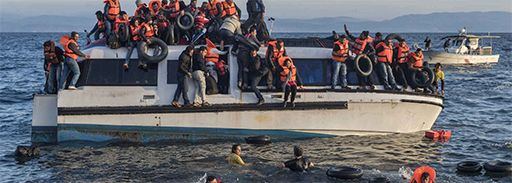 18.04.2016 – FIDH – On 18 April 2015, a vessel capsized off the Libyan coast with around 850 migrants aboard, only 28 are known to have survived. If this shipwreck is the deadliest the UN Refugee agency (UNHCR) has recorded in the Mediterranean, it was only one in a long series.
18.04.2016 – FIDH – On 18 April 2015, a vessel capsized off the Libyan coast with around 850 migrants aboard, only 28 are known to have survived. If this shipwreck is the deadliest the UN Refugee agency (UNHCR) has recorded in the Mediterranean, it was only one in a long series.
Instead of primarily focusing on saving lives, increasing its resettlement capacity and addressing the root causes of violence leading people to flee their home country, the European Union’s (EU) response has been to enhance its external border protection at all costs and outsource its migration management to countries, which cannot provide adequate human rights safeguards.
One year on, FIDH denounces the ugly truth behind a cynical deal and exposes, using the concept of “what it really is?”, the reality of the situation of migrants and asylum seekers in Greece, Turkey and the Aegean Sea. A reality that starkly contrasts with the European Union and its member states wishful thinking and hypocritical sugar-coated discourses on the promotion and protection of human rights.
On March 18, European Union leaders and Turkey struck a shameful deal providing for fast-track procedures aimed at returning ‘all new irregular migrants’ reaching the Greek islands after March 20 whose asylum claim is deemed unfounded or inadmissible back to Turkey and an infamous ‘migrant swap’. For each Syrian sent back to Turkey, the EU will resettle a Syrian refugee from Turkey. Deportations started on April 4. European leaders argue that only those who failed to claim asylum in Greece or whose claims were rejected will be deported.
The UNHCR has already cast doubt regarding the legality of the deportation of 13 people out of the 202 deported on April 4. (Read ‘What Greece really is’ by Dimitris Christopoulos). With its equally inadequate asylum system and the dramatic deterioration of the overall human rights situation, Turkey cannot be considered a safe third country for those seeking international protection.
